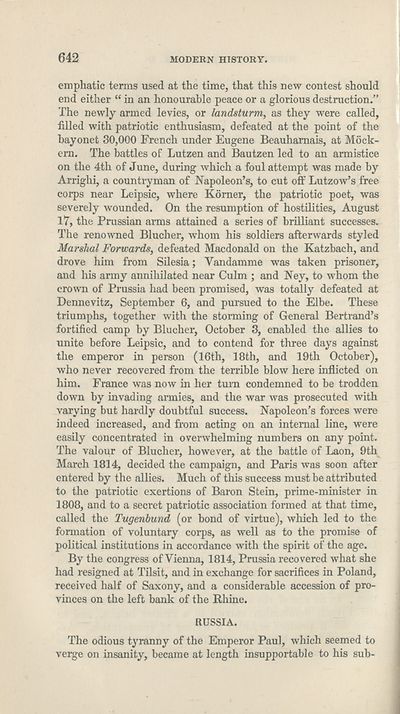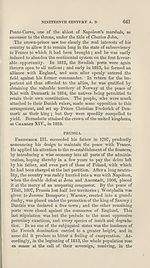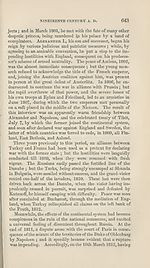Download files
Complete book:
Individual page:
Thumbnail gallery: Grid view | List view

642
MODERN HISTORY.
emphatic terms used at the time, that this new contest should
end either “ in an honourable peace or a glorious destruction.”
The newly armed levies, or landsturm, as they were called,
filled with patriotic enthusiasm, defeated at the point of the
bayonet 30,000 French under Eugene Beauhamais, at Mock-
ern. The battles of Lutzen and Bautzen led to an armistice
on the 4th of June, during which a foul attempt was made by
Arrighi, a countryman of Napoleon’s, to cut off Lutzow’s free
corps near Leipsic, where Komer, the patriotic poet, was
severely wounded. On the resumption of hostilities, August
17, the Prussian arms attained a series of brilliant successes.
The renowned Blucher, whom his soldiers afterwards styled
Marshal Forwards, defeated Macdonald on the Katzbach, and
drove him from Silesia; Yandamme was taken prisoner,
and his army annihilated near Culm ; and Ney, to whom the
crown of Prussia had been promised, was totally defeated at
Dennevitz, September 6, and pursued to the Elbe. These
triumphs, together with the storming of General Bertrand’s
fortified camp by Blucher, October 3, enabled the allies to
unite before Leipsic, and to contend for three days against
the emperor in person (16th, 18th, and 19th October),
who never recovered from the terrible blow here inflicted on
him. France was now in her turn condemned to be trodden
down by invading armies, and the war was prosecuted with
varying but hardly doubtful success. Napoleon’s forces were
indeed increased, and from acting on an internal line, were
easily concentrated in overwhelming numbers on any point.
The valour of Blucher, however, at the battle of Laon, 9th
March 1814, decided the campaign, and Paris was soon after
entered by the allies. Much of this success must be attributed
to the patriotic exertions of Baron Stein, prime-minister in
1808, and to a secret patriotic association formed at that time,
called the Tugenbund (or bond of virtue), which led to the
formation of voluntary corps, as well as to the promise of
political institutions in accordance with the spirit of the age.
By the congress of Vienna, 1814, Prussia recovered what she
had resigned at Tilsit, and in exchange for sacrifices in Poland,
received half of Saxony, and a considerable accession of pro¬
vinces on the left bank of the Rhine.
RUSSIA.
The odious tyranny of the Emperor Paul, which seemed to
verge on insanity, became at length insupportable to his sub-
MODERN HISTORY.
emphatic terms used at the time, that this new contest should
end either “ in an honourable peace or a glorious destruction.”
The newly armed levies, or landsturm, as they were called,
filled with patriotic enthusiasm, defeated at the point of the
bayonet 30,000 French under Eugene Beauhamais, at Mock-
ern. The battles of Lutzen and Bautzen led to an armistice
on the 4th of June, during which a foul attempt was made by
Arrighi, a countryman of Napoleon’s, to cut off Lutzow’s free
corps near Leipsic, where Komer, the patriotic poet, was
severely wounded. On the resumption of hostilities, August
17, the Prussian arms attained a series of brilliant successes.
The renowned Blucher, whom his soldiers afterwards styled
Marshal Forwards, defeated Macdonald on the Katzbach, and
drove him from Silesia; Yandamme was taken prisoner,
and his army annihilated near Culm ; and Ney, to whom the
crown of Prussia had been promised, was totally defeated at
Dennevitz, September 6, and pursued to the Elbe. These
triumphs, together with the storming of General Bertrand’s
fortified camp by Blucher, October 3, enabled the allies to
unite before Leipsic, and to contend for three days against
the emperor in person (16th, 18th, and 19th October),
who never recovered from the terrible blow here inflicted on
him. France was now in her turn condemned to be trodden
down by invading armies, and the war was prosecuted with
varying but hardly doubtful success. Napoleon’s forces were
indeed increased, and from acting on an internal line, were
easily concentrated in overwhelming numbers on any point.
The valour of Blucher, however, at the battle of Laon, 9th
March 1814, decided the campaign, and Paris was soon after
entered by the allies. Much of this success must be attributed
to the patriotic exertions of Baron Stein, prime-minister in
1808, and to a secret patriotic association formed at that time,
called the Tugenbund (or bond of virtue), which led to the
formation of voluntary corps, as well as to the promise of
political institutions in accordance with the spirit of the age.
By the congress of Vienna, 1814, Prussia recovered what she
had resigned at Tilsit, and in exchange for sacrifices in Poland,
received half of Saxony, and a considerable accession of pro¬
vinces on the left bank of the Rhine.
RUSSIA.
The odious tyranny of the Emperor Paul, which seemed to
verge on insanity, became at length insupportable to his sub-
Set display mode to:
![]() Universal Viewer |
Universal Viewer | ![]() Mirador |
Large image | Transcription
Mirador |
Large image | Transcription
| Antiquarian books of Scotland > Education > Elements of universal history on a new and systematic plan > (662) |
|---|
| Permanent URL | https://digital.nls.uk/127588084 |
|---|
| Description | Thousands of printed books from the Antiquarian Books of Scotland collection which dates from 1641 to the 1980s. The collection consists of 14,800 books which were published in Scotland or have a Scottish connection, e.g. through the author, printer or owner. Subjects covered include sport, education, diseases, adventure, occupations, Jacobites, politics and religion. Among the 29 languages represented are English, Gaelic, Italian, French, Russian and Swedish. |
|---|

